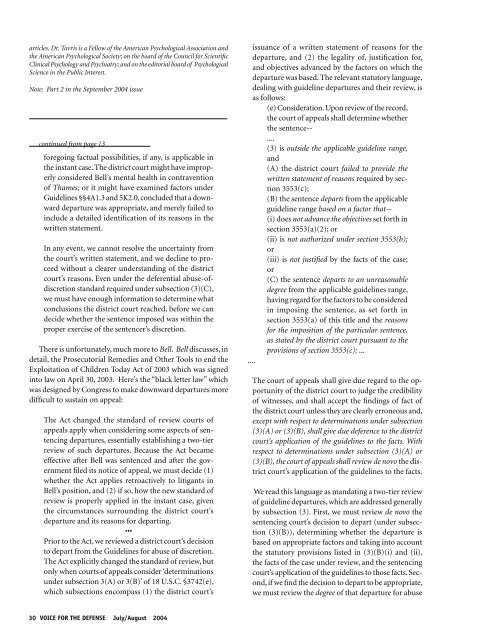July/August 2004 VOICE FOR THE DEFENSE 1
July/August 2004 VOICE FOR THE DEFENSE 1
July/August 2004 VOICE FOR THE DEFENSE 1
You also want an ePaper? Increase the reach of your titles
YUMPU automatically turns print PDFs into web optimized ePapers that Google loves.
articles. Dr. Tavris is a Fellow of the American Psychological Association and<br />
the American Psychological Society; on the board of the Council for Scientific<br />
Clinical Psychology and Psychiatry; and on the editorial board of Psychological<br />
Science in the Public Interest.<br />
Note: Part 2 in the September <strong>2004</strong> issue<br />
continued from page 13<br />
foregoing factual possibilities, if any, is applicable in<br />
the instant case. The district court might have improperly<br />
considered Bell’s mental health in contravention<br />
of Thames; or it might have examined factors under<br />
Guidelines §§4A1.3 and 5K2.0, concluded that a downward<br />
departure was appropriate, and merely failed to<br />
include a detailed identification of its reasons in the<br />
written statement.<br />
In any event, we cannot resolve the uncertainty from<br />
the court’s written statement, and we decline to proceed<br />
without a clearer understanding of the district<br />
court’s reasons. Even under the deferential abuse-ofdiscretion<br />
standard required under subsection (3)(C),<br />
we must have enough information to determine what<br />
conclusions the district court reached, before we can<br />
decide whether the sentence imposed was within the<br />
proper exercise of the sentencer’s discretion.<br />
There is unfortunately, much more to Bell. Bell discusses, in<br />
detail, the Prosecutorial Remedies and Other Tools to end the<br />
Exploitation of Children Today Act of 2003 which was signed<br />
into law on April 30, 2003. Here’s the “black letter law” which<br />
was designed by Congress to make downward departures more<br />
difficult to sustain on appeal:<br />
The Act changed the standard of review courts of<br />
appeals apply when considering some aspects of sentencing<br />
departures, essentially establishing a two-tier<br />
review of such departures. Because the Act became<br />
effective after Bell was sentenced and after the government<br />
filed its notice of appeal, we must decide (1)<br />
whether the Act applies retroactively to litigants in<br />
Bell’s position, and (2) if so, how the new standard of<br />
review is properly applied in the instant case, given<br />
the circumstances surrounding the district court’s<br />
departure and its reasons for departing.<br />
•••<br />
Prior to the Act, we reviewed a district court’s decision<br />
to depart from the Guidelines for abuse of discretion.<br />
The Act explicitly changed the standard of review, but<br />
only when courts of appeals consider ‘determinations<br />
under subsection 3(A) or 3(B)’ of 18 U.S.C. §3742(e),<br />
which subsections encompass (1) the district court’s<br />
issuance of a written statement of reasons for the<br />
departure, and (2) the legality of, justification for,<br />
and objectives advanced by the factors on which the<br />
departure was based. The relevant statutory language,<br />
dealing with guideline departures and their review, is<br />
as follows:<br />
(e) Consideration. Upon review of the record,<br />
the court of appeals shall determine whether<br />
the sentence--<br />
....<br />
(3) is outside the applicable guideline range,<br />
and<br />
(A) the district court failed to provide the<br />
written statement of reasons required by section<br />
3553(c);<br />
(B) the sentence departs from the applicable<br />
guideline range based on a factor that--<br />
(i) does not advance the objectives set forth in<br />
section 3553(a)(2); or<br />
(ii) is not authorized under section 3553(b);<br />
or<br />
(iii) is not justified by the facts of the case;<br />
or<br />
(C) the sentence departs to an unreasonable<br />
degree from the applicable guidelines range,<br />
having regard for the factors to be considered<br />
in imposing the sentence, as set forth in<br />
section 3553(a) of this title and the reasons<br />
for the imposition of the particular sentence,<br />
as stated by the district court pursuant to the<br />
provisions of section 3553(c); ...<br />
....<br />
The court of appeals shall give due regard to the opportunity<br />
of the district court to judge the credibility<br />
of witnesses, and shall accept the findings of fact of<br />
the district court unless they are clearly erroneous and,<br />
except with respect to determinations under subsection<br />
(3)(A) or (3)(B), shall give due deference to the district<br />
court’s application of the guidelines to the facts. With<br />
respect to determinations under subsection (3)(A) or<br />
(3)(B), the court of appeals shall review de novo the district<br />
court’s application of the guidelines to the facts.<br />
We read this language as mandating a two-tier review<br />
of guideline departures, which are addressed generally<br />
by subsection (3). First, we must review de novo the<br />
sentencing court’s decision to depart (under subsection<br />
(3)(B)), determining whether the departure is<br />
based on appropriate factors and taking into account<br />
the statutory provisions listed in (3)(B)(i) and (ii),<br />
the facts of the case under review, and the sentencing<br />
court’s application of the guidelines to those facts. Second,<br />
if we find the decision to depart to be appropriate,<br />
we must review the degree of that departure for abuse<br />
30 <strong>VOICE</strong> <strong>FOR</strong> <strong>THE</strong> <strong>DEFENSE</strong> <strong>July</strong>/<strong>August</strong> <strong>2004</strong>

















